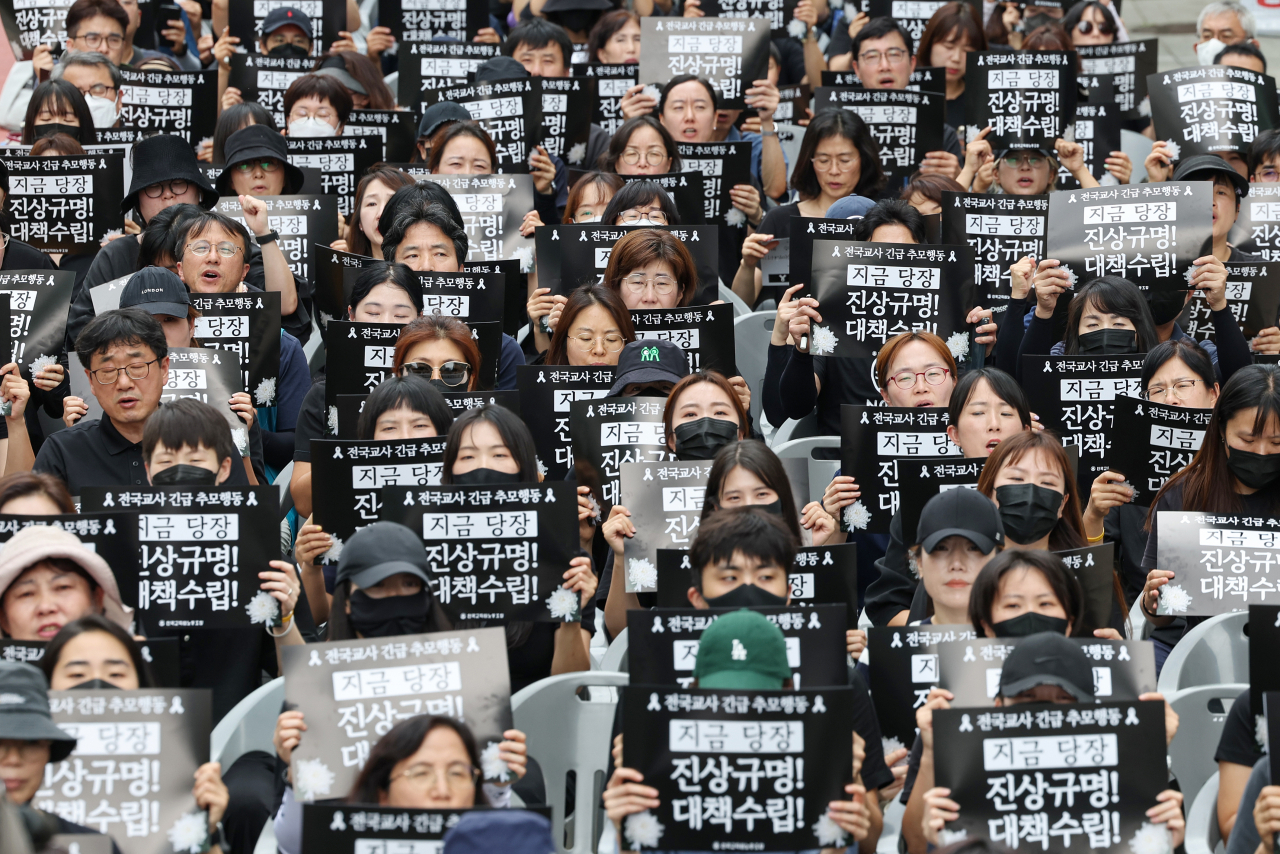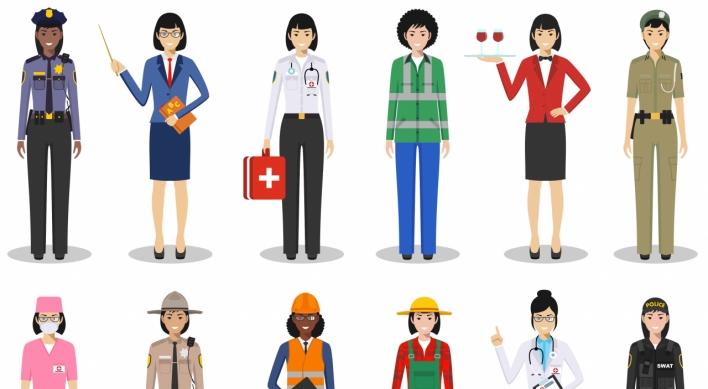‘Like students, teachers deserve protection of their rights in schools’
Teachers call for legal protection from demanding parents and students, better working conditions
By Park Jun-heePublished : July 23, 2023 - 15:40

Koh, a 23-year-old elementary teacher with two years of experience working at an elementary school in Busan, had a sixth-grade male student in her class last year who inflicted harm on himself in front of his peers, vomited every morning in class, skipped classes and assaulted teachers. But she wasn’t able to protect either herself or other students because the school refused to remove the student from the class, she said.
She got a new class starting this year, but things have not gotten much better.
In the first semester, she had to face complaints to the school’s administration office made by parents of third-grade students about her actions. They called and texted her on a daily basis, urging her to pay extra attention to their children, such as asking her to leave favorable comments on their academic records and to make sure the kids were well-fed at school.
Koh was not the only teacher at her school who was suffering stress due to parents’ demands and the fear of being assaulted by students. But no one raised their voice, as they were told by the school that teachers would eventually be in a disadvantageous position if they tried to confront parents and students, and that there were few legal measures to protect them.
Koh is one of the many teachers crying foul over the decline of teachers’ rights in classrooms -- an issue that has come to the forefront following the apparent suicide of an elementary teacher, who was also 23, in Seoul’s Seocho-gu last week.
The death has raised questions about the absence of legal measures to protect teachers’ rights and autonomy in the classroom.
A total of 1,133 teachers were subject to physical assault or attacks by students and parents between 2018 and 2022, according to data released by the Ministry of Education. Also, the number of reported cases of students breaching the rights of teachers in classrooms surpassed 2,000 last year.
“Teachers are still left in the dark. We should have a sense of control in our classrooms because, in the end, teachers and parents want the best for their kids and students,” said Koh, requesting to be identified only by her surname.
In light of teachers’ waning autonomy, the Education Ministry announced in September last year that measures are underway to address the violation of teachers’ rights and reiterated in June that the government would seek to strengthen public education.
Koh, however, said no changes have been made.
She called for enacting a law that improves working conditions for teachers, including recruiting teachers that are specifically for at-risk or special needs students and creating an administrative body solely dealing with parental complaints so that educators can minimize contact with such issues.
Currently, there are at least one or two students who are at risk or have special needs in a typical class of 24 to 25, and they hinder class almost every day as homeroom teachers have to look after them, according to Koh.
Schools can hire external instructors for such students, but the system requires homeroom teachers to chaperone the entire class. Teachers, however, are unwilling to educate challenging students, citing fatigue and stress, Koh said. Also, some parents complain that employing a part-time teacher for their troubled child “violates the right to education.”
Another elementary school teacher surnamed Lee at a public school in Seoul stressed that teachers must be given the right to make video and sound recordings of parental complaints to defend themselves from defamation of character. She also urged the government to grant teachers the right to receive appropriate compensation from parents and students for acts of wrongdoing.
“A parent once wielded a stun gun at teachers in the teachers’ office and threatened teachers’ lives by sending pictures of a knife. We are pushing to restore our basic rights to educate students,” Lee told The Korea Herald.
Just as students are protected under the Ordinance of Students Rights, teachers also need measures that safeguard their autonomy, she added.
The student rights ordinance is in effect in schools in Seoul, Gyeonggi Province, Gwangju, North Jeolla Province, Jeju Island and South Chungcheong Province. On Friday, Education Minister Lee Ju-ho hinted during a meeting with the Korean Federation of Teachers’ Associations that changes could soon be made to the ordinance, citing an increasing number of incidents of disruptive behavior in the classroom over the years. There are no protective measures for teachers as of now.
Another teacher at a public school in Seoul told The Korea Herald that schools should have a policy prohibiting the sharing of personal information, such as teachers’ phone numbers and addresses, to parents.
“A divorced parent regularly called me, even during weekends, and sexually harassed me by saying that he wants me to be his child’s mother, or his girlfriend,” said the teacher who wished to speak anonymously.
“But what made me angry was the school’s attitude, as higher-ups wanted to cover it up when I reported the issue just because I was a young teacher with little experience. The school also said personal information is shared for the purpose of children’s well-being,” she added.
Park Nam-gi, a professor at Gwangju National University of Education, echoed that schools should take a hard-line approach when dealing with parents and students who overstep boundaries.
“On top of everything else, schools are taking part in silencing a student’s misconduct or parents’ complaints instead of helping teachers, which gives parents more say in school affairs. Also, it could lead to peer pressure, resulting in more impudent students,” Park said.
“Laws and measures for teachers are needed. But schools, in the first place, should stop parents from bullying teachers and students’ abusive behavior. Without such changes in schools, the education landscape will never change,” he said.







![[AtoZ Korean Mind] Does your job define who you are? Should it?](http://res.heraldm.com/phpwas/restmb_idxmake.php?idx=644&simg=/content/image/2024/05/06/20240506050099_0.jpg&u=)











